International Relations: Post-WWII Realism vs. Idealism Analysis
VerifiedAdded on 2022/11/26
|11
|3221
|377
Essay
AI Summary
This essay critically examines the concepts of realism and idealism within the context of international relations, particularly in the aftermath of the Second World War. It explores how the war reshaped global politics, leading to the rise of the United States and the Soviet Union, and the subsequent Cold War. The essay delves into the core tenets of realism, emphasizing conflict and power dynamics, and contrasts them with idealism, which prioritizes cooperation and international institutions like the United Nations and NATO. It analyzes key events, including the bombing of Hiroshima and Nagasaki, the formation of West Germany, the Truman Doctrine, and the Berlin blockade, to assess whether the post-war era reflected a victory of realism or idealism. The essay also considers the impact of the Cold War on the triumph of idealism and the rise of democratic movements, ultimately arguing that while the Second World War did not fully end realism, it fostered the growth of democratic states which decreased realism aspects in the 1990s.
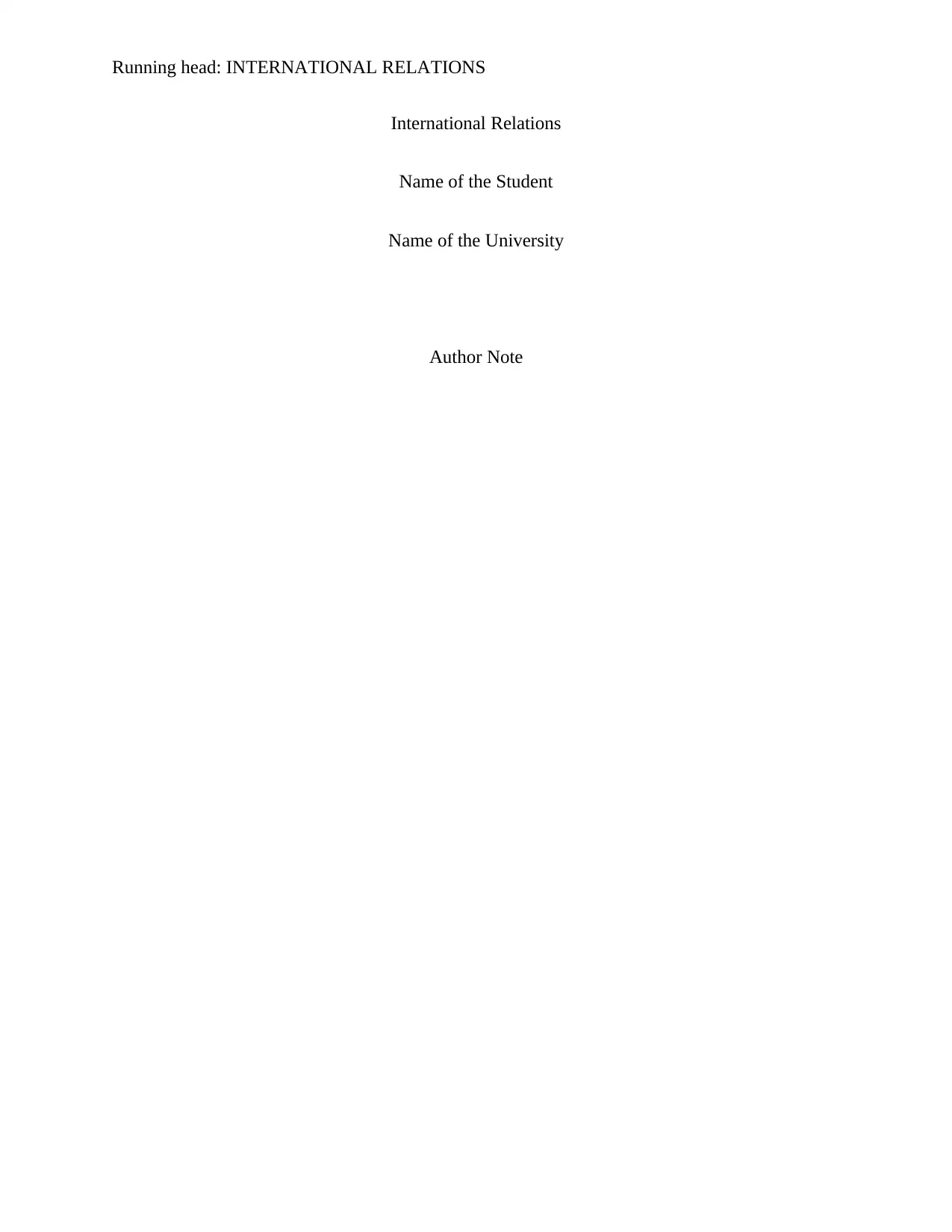
Running head: INTERNATIONAL RELATIONS
International Relations
Name of the Student
Name of the University
Author Note
International Relations
Name of the Student
Name of the University
Author Note
Paraphrase This Document
Need a fresh take? Get an instant paraphrase of this document with our AI Paraphraser
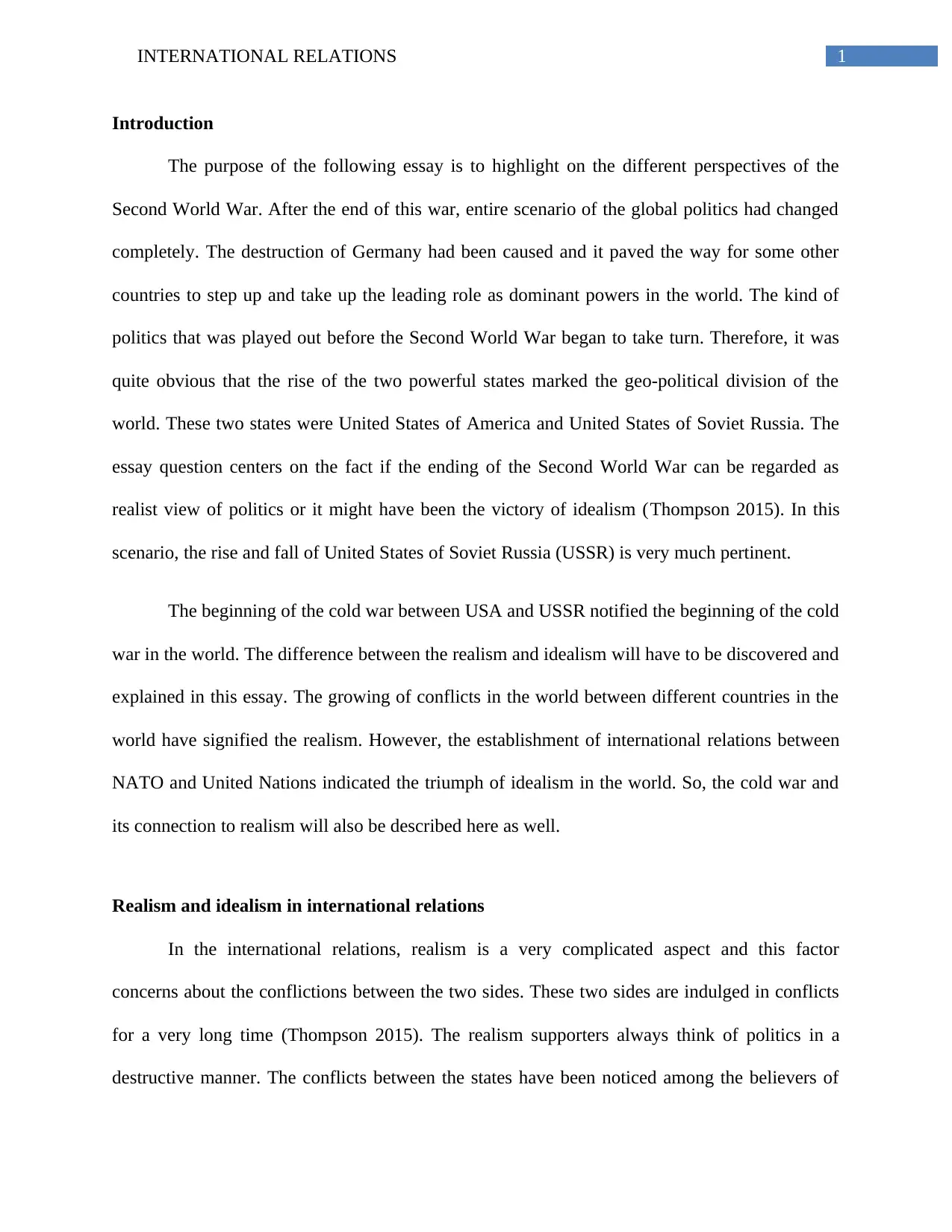
1INTERNATIONAL RELATIONS
Introduction
The purpose of the following essay is to highlight on the different perspectives of the
Second World War. After the end of this war, entire scenario of the global politics had changed
completely. The destruction of Germany had been caused and it paved the way for some other
countries to step up and take up the leading role as dominant powers in the world. The kind of
politics that was played out before the Second World War began to take turn. Therefore, it was
quite obvious that the rise of the two powerful states marked the geo-political division of the
world. These two states were United States of America and United States of Soviet Russia. The
essay question centers on the fact if the ending of the Second World War can be regarded as
realist view of politics or it might have been the victory of idealism (Thompson 2015). In this
scenario, the rise and fall of United States of Soviet Russia (USSR) is very much pertinent.
The beginning of the cold war between USA and USSR notified the beginning of the cold
war in the world. The difference between the realism and idealism will have to be discovered and
explained in this essay. The growing of conflicts in the world between different countries in the
world have signified the realism. However, the establishment of international relations between
NATO and United Nations indicated the triumph of idealism in the world. So, the cold war and
its connection to realism will also be described here as well.
Realism and idealism in international relations
In the international relations, realism is a very complicated aspect and this factor
concerns about the conflictions between the two sides. These two sides are indulged in conflicts
for a very long time (Thompson 2015). The realism supporters always think of politics in a
destructive manner. The conflicts between the states have been noticed among the believers of
Introduction
The purpose of the following essay is to highlight on the different perspectives of the
Second World War. After the end of this war, entire scenario of the global politics had changed
completely. The destruction of Germany had been caused and it paved the way for some other
countries to step up and take up the leading role as dominant powers in the world. The kind of
politics that was played out before the Second World War began to take turn. Therefore, it was
quite obvious that the rise of the two powerful states marked the geo-political division of the
world. These two states were United States of America and United States of Soviet Russia. The
essay question centers on the fact if the ending of the Second World War can be regarded as
realist view of politics or it might have been the victory of idealism (Thompson 2015). In this
scenario, the rise and fall of United States of Soviet Russia (USSR) is very much pertinent.
The beginning of the cold war between USA and USSR notified the beginning of the cold
war in the world. The difference between the realism and idealism will have to be discovered and
explained in this essay. The growing of conflicts in the world between different countries in the
world have signified the realism. However, the establishment of international relations between
NATO and United Nations indicated the triumph of idealism in the world. So, the cold war and
its connection to realism will also be described here as well.
Realism and idealism in international relations
In the international relations, realism is a very complicated aspect and this factor
concerns about the conflictions between the two sides. These two sides are indulged in conflicts
for a very long time (Thompson 2015). The realism supporters always think of politics in a
destructive manner. The conflicts between the states have been noticed among the believers of
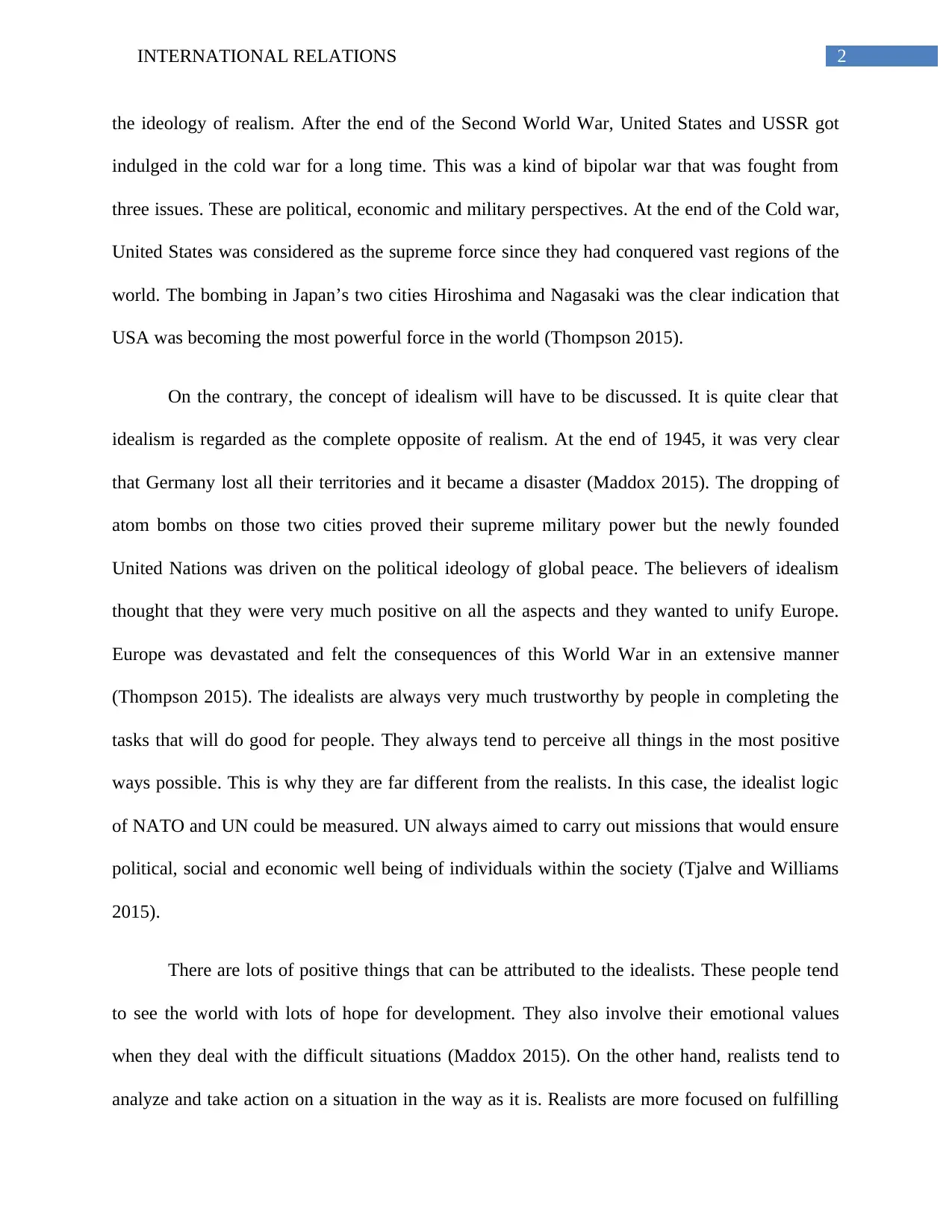
2INTERNATIONAL RELATIONS
the ideology of realism. After the end of the Second World War, United States and USSR got
indulged in the cold war for a long time. This was a kind of bipolar war that was fought from
three issues. These are political, economic and military perspectives. At the end of the Cold war,
United States was considered as the supreme force since they had conquered vast regions of the
world. The bombing in Japan’s two cities Hiroshima and Nagasaki was the clear indication that
USA was becoming the most powerful force in the world (Thompson 2015).
On the contrary, the concept of idealism will have to be discussed. It is quite clear that
idealism is regarded as the complete opposite of realism. At the end of 1945, it was very clear
that Germany lost all their territories and it became a disaster (Maddox 2015). The dropping of
atom bombs on those two cities proved their supreme military power but the newly founded
United Nations was driven on the political ideology of global peace. The believers of idealism
thought that they were very much positive on all the aspects and they wanted to unify Europe.
Europe was devastated and felt the consequences of this World War in an extensive manner
(Thompson 2015). The idealists are always very much trustworthy by people in completing the
tasks that will do good for people. They always tend to perceive all things in the most positive
ways possible. This is why they are far different from the realists. In this case, the idealist logic
of NATO and UN could be measured. UN always aimed to carry out missions that would ensure
political, social and economic well being of individuals within the society (Tjalve and Williams
2015).
There are lots of positive things that can be attributed to the idealists. These people tend
to see the world with lots of hope for development. They also involve their emotional values
when they deal with the difficult situations (Maddox 2015). On the other hand, realists tend to
analyze and take action on a situation in the way as it is. Realists are more focused on fulfilling
the ideology of realism. After the end of the Second World War, United States and USSR got
indulged in the cold war for a long time. This was a kind of bipolar war that was fought from
three issues. These are political, economic and military perspectives. At the end of the Cold war,
United States was considered as the supreme force since they had conquered vast regions of the
world. The bombing in Japan’s two cities Hiroshima and Nagasaki was the clear indication that
USA was becoming the most powerful force in the world (Thompson 2015).
On the contrary, the concept of idealism will have to be discussed. It is quite clear that
idealism is regarded as the complete opposite of realism. At the end of 1945, it was very clear
that Germany lost all their territories and it became a disaster (Maddox 2015). The dropping of
atom bombs on those two cities proved their supreme military power but the newly founded
United Nations was driven on the political ideology of global peace. The believers of idealism
thought that they were very much positive on all the aspects and they wanted to unify Europe.
Europe was devastated and felt the consequences of this World War in an extensive manner
(Thompson 2015). The idealists are always very much trustworthy by people in completing the
tasks that will do good for people. They always tend to perceive all things in the most positive
ways possible. This is why they are far different from the realists. In this case, the idealist logic
of NATO and UN could be measured. UN always aimed to carry out missions that would ensure
political, social and economic well being of individuals within the society (Tjalve and Williams
2015).
There are lots of positive things that can be attributed to the idealists. These people tend
to see the world with lots of hope for development. They also involve their emotional values
when they deal with the difficult situations (Maddox 2015). On the other hand, realists tend to
analyze and take action on a situation in the way as it is. Realists are more focused on fulfilling
⊘ This is a preview!⊘
Do you want full access?
Subscribe today to unlock all pages.

Trusted by 1+ million students worldwide
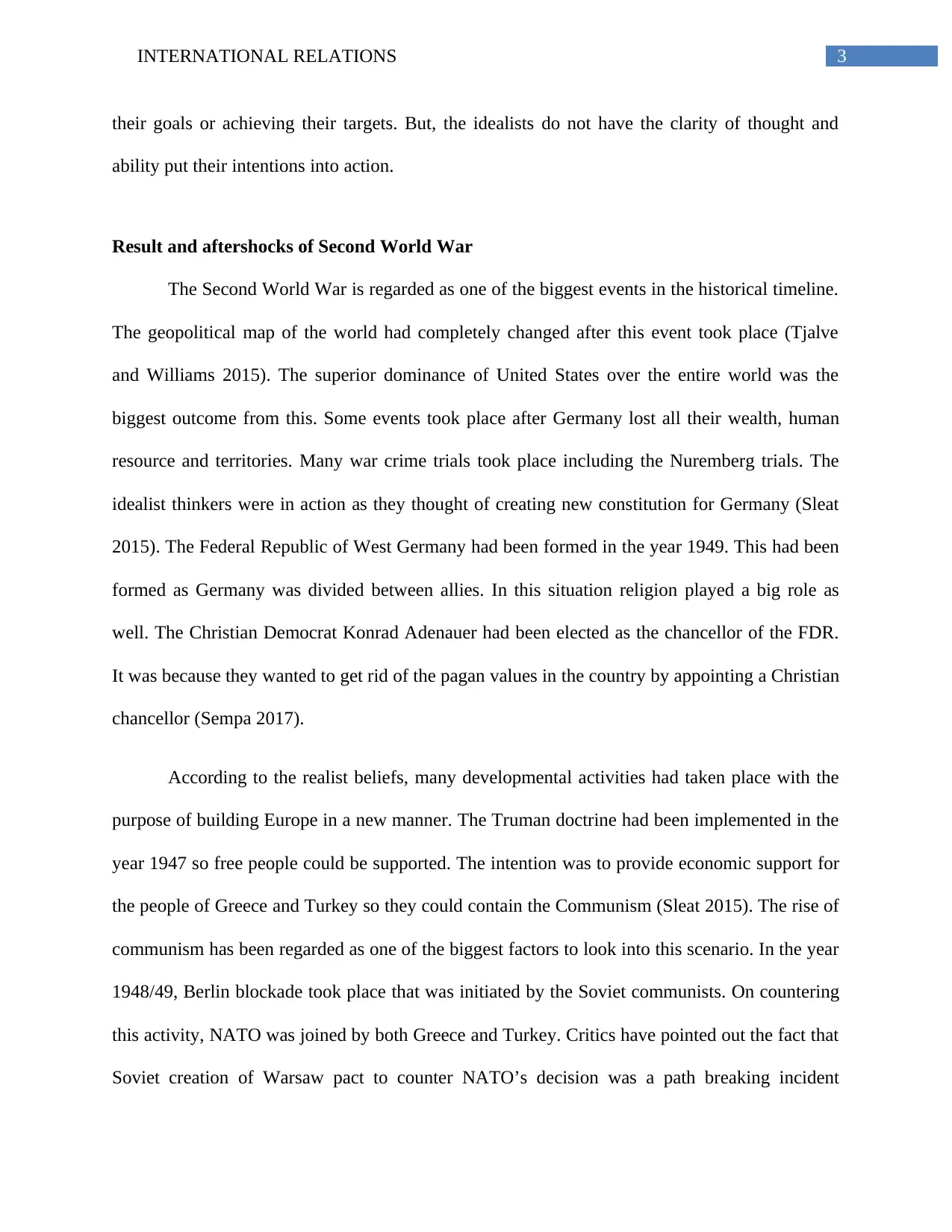
3INTERNATIONAL RELATIONS
their goals or achieving their targets. But, the idealists do not have the clarity of thought and
ability put their intentions into action.
Result and aftershocks of Second World War
The Second World War is regarded as one of the biggest events in the historical timeline.
The geopolitical map of the world had completely changed after this event took place (Tjalve
and Williams 2015). The superior dominance of United States over the entire world was the
biggest outcome from this. Some events took place after Germany lost all their wealth, human
resource and territories. Many war crime trials took place including the Nuremberg trials. The
idealist thinkers were in action as they thought of creating new constitution for Germany (Sleat
2015). The Federal Republic of West Germany had been formed in the year 1949. This had been
formed as Germany was divided between allies. In this situation religion played a big role as
well. The Christian Democrat Konrad Adenauer had been elected as the chancellor of the FDR.
It was because they wanted to get rid of the pagan values in the country by appointing a Christian
chancellor (Sempa 2017).
According to the realist beliefs, many developmental activities had taken place with the
purpose of building Europe in a new manner. The Truman doctrine had been implemented in the
year 1947 so free people could be supported. The intention was to provide economic support for
the people of Greece and Turkey so they could contain the Communism (Sleat 2015). The rise of
communism has been regarded as one of the biggest factors to look into this scenario. In the year
1948/49, Berlin blockade took place that was initiated by the Soviet communists. On countering
this activity, NATO was joined by both Greece and Turkey. Critics have pointed out the fact that
Soviet creation of Warsaw pact to counter NATO’s decision was a path breaking incident
their goals or achieving their targets. But, the idealists do not have the clarity of thought and
ability put their intentions into action.
Result and aftershocks of Second World War
The Second World War is regarded as one of the biggest events in the historical timeline.
The geopolitical map of the world had completely changed after this event took place (Tjalve
and Williams 2015). The superior dominance of United States over the entire world was the
biggest outcome from this. Some events took place after Germany lost all their wealth, human
resource and territories. Many war crime trials took place including the Nuremberg trials. The
idealist thinkers were in action as they thought of creating new constitution for Germany (Sleat
2015). The Federal Republic of West Germany had been formed in the year 1949. This had been
formed as Germany was divided between allies. In this situation religion played a big role as
well. The Christian Democrat Konrad Adenauer had been elected as the chancellor of the FDR.
It was because they wanted to get rid of the pagan values in the country by appointing a Christian
chancellor (Sempa 2017).
According to the realist beliefs, many developmental activities had taken place with the
purpose of building Europe in a new manner. The Truman doctrine had been implemented in the
year 1947 so free people could be supported. The intention was to provide economic support for
the people of Greece and Turkey so they could contain the Communism (Sleat 2015). The rise of
communism has been regarded as one of the biggest factors to look into this scenario. In the year
1948/49, Berlin blockade took place that was initiated by the Soviet communists. On countering
this activity, NATO was joined by both Greece and Turkey. Critics have pointed out the fact that
Soviet creation of Warsaw pact to counter NATO’s decision was a path breaking incident
Paraphrase This Document
Need a fresh take? Get an instant paraphrase of this document with our AI Paraphraser
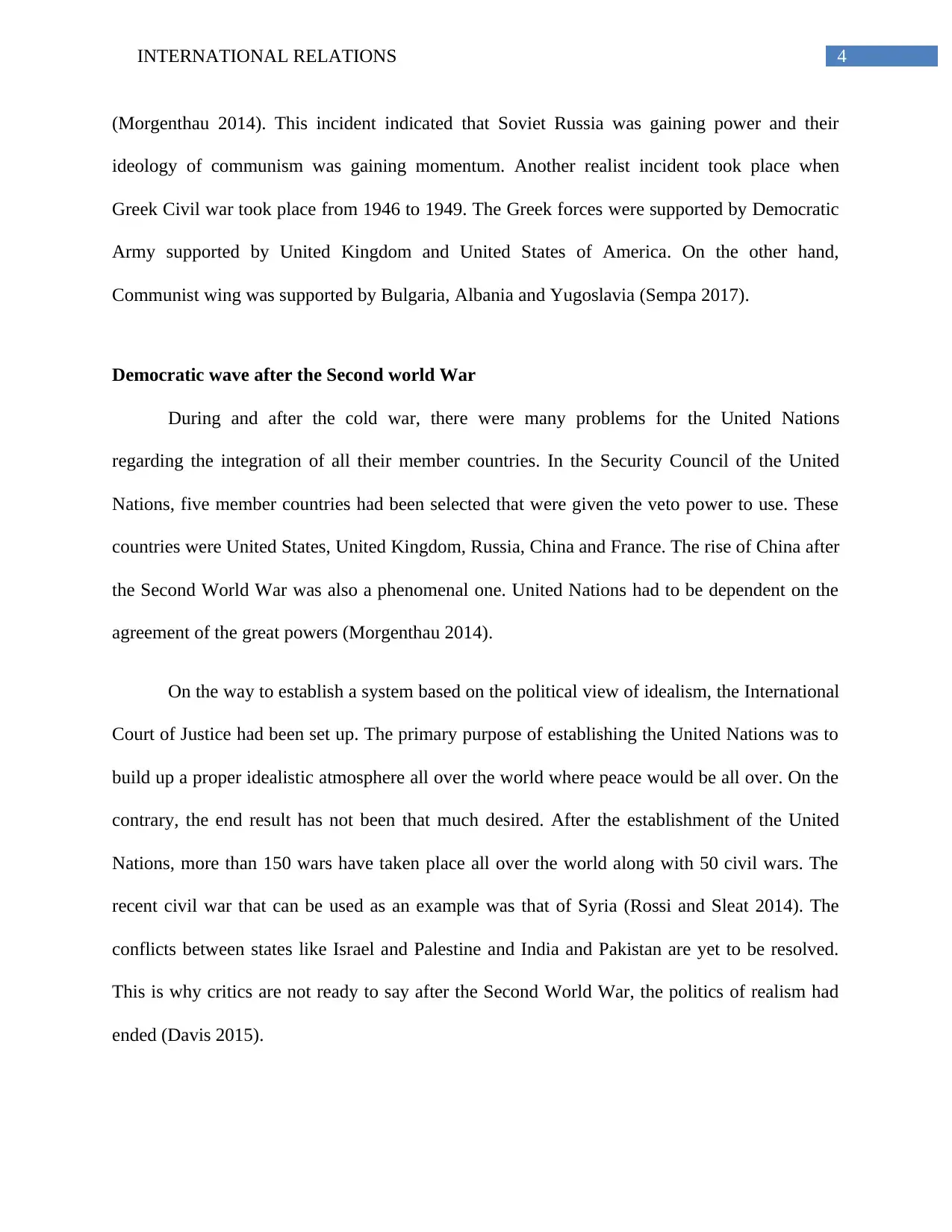
4INTERNATIONAL RELATIONS
(Morgenthau 2014). This incident indicated that Soviet Russia was gaining power and their
ideology of communism was gaining momentum. Another realist incident took place when
Greek Civil war took place from 1946 to 1949. The Greek forces were supported by Democratic
Army supported by United Kingdom and United States of America. On the other hand,
Communist wing was supported by Bulgaria, Albania and Yugoslavia (Sempa 2017).
Democratic wave after the Second world War
During and after the cold war, there were many problems for the United Nations
regarding the integration of all their member countries. In the Security Council of the United
Nations, five member countries had been selected that were given the veto power to use. These
countries were United States, United Kingdom, Russia, China and France. The rise of China after
the Second World War was also a phenomenal one. United Nations had to be dependent on the
agreement of the great powers (Morgenthau 2014).
On the way to establish a system based on the political view of idealism, the International
Court of Justice had been set up. The primary purpose of establishing the United Nations was to
build up a proper idealistic atmosphere all over the world where peace would be all over. On the
contrary, the end result has not been that much desired. After the establishment of the United
Nations, more than 150 wars have taken place all over the world along with 50 civil wars. The
recent civil war that can be used as an example was that of Syria (Rossi and Sleat 2014). The
conflicts between states like Israel and Palestine and India and Pakistan are yet to be resolved.
This is why critics are not ready to say after the Second World War, the politics of realism had
ended (Davis 2015).
(Morgenthau 2014). This incident indicated that Soviet Russia was gaining power and their
ideology of communism was gaining momentum. Another realist incident took place when
Greek Civil war took place from 1946 to 1949. The Greek forces were supported by Democratic
Army supported by United Kingdom and United States of America. On the other hand,
Communist wing was supported by Bulgaria, Albania and Yugoslavia (Sempa 2017).
Democratic wave after the Second world War
During and after the cold war, there were many problems for the United Nations
regarding the integration of all their member countries. In the Security Council of the United
Nations, five member countries had been selected that were given the veto power to use. These
countries were United States, United Kingdom, Russia, China and France. The rise of China after
the Second World War was also a phenomenal one. United Nations had to be dependent on the
agreement of the great powers (Morgenthau 2014).
On the way to establish a system based on the political view of idealism, the International
Court of Justice had been set up. The primary purpose of establishing the United Nations was to
build up a proper idealistic atmosphere all over the world where peace would be all over. On the
contrary, the end result has not been that much desired. After the establishment of the United
Nations, more than 150 wars have taken place all over the world along with 50 civil wars. The
recent civil war that can be used as an example was that of Syria (Rossi and Sleat 2014). The
conflicts between states like Israel and Palestine and India and Pakistan are yet to be resolved.
This is why critics are not ready to say after the Second World War, the politics of realism had
ended (Davis 2015).
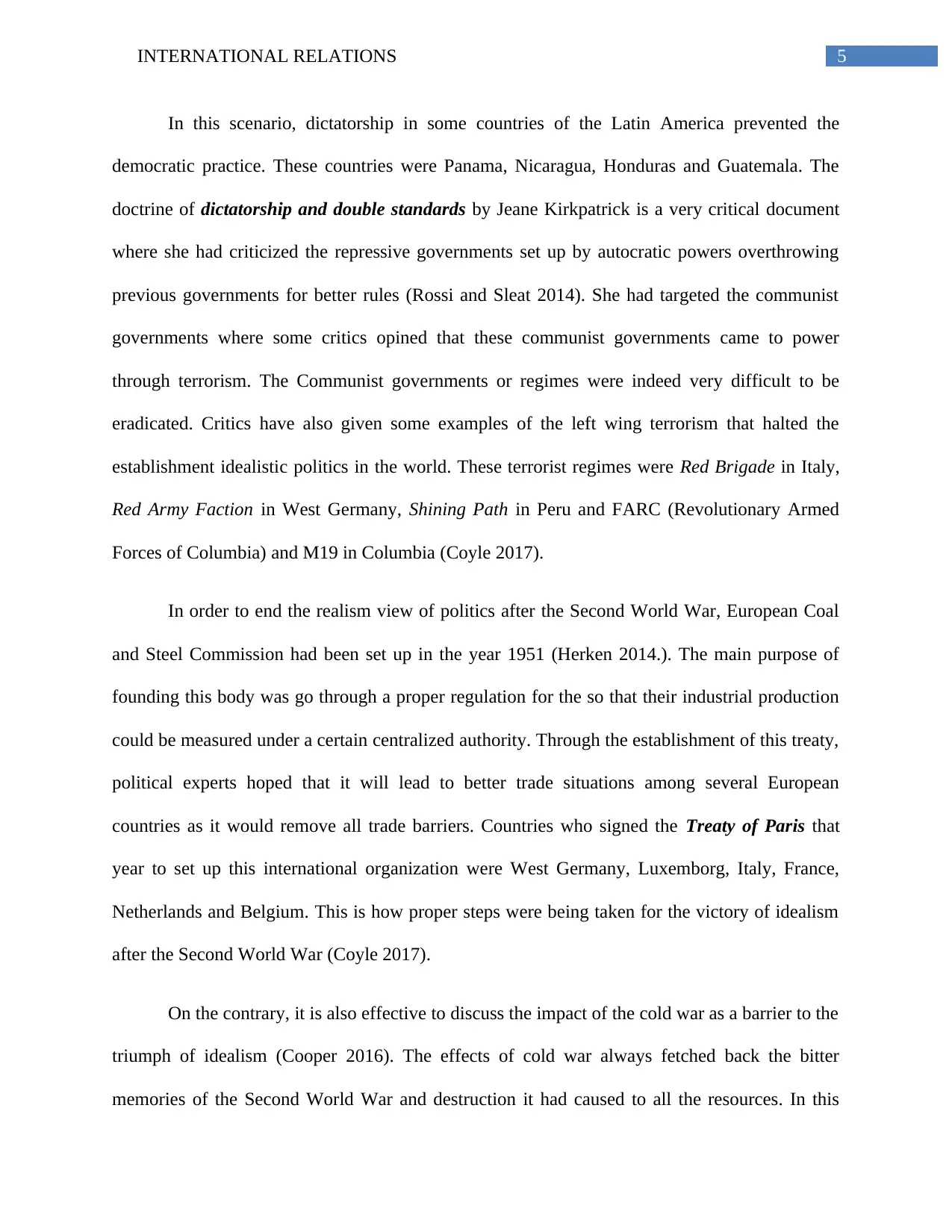
5INTERNATIONAL RELATIONS
In this scenario, dictatorship in some countries of the Latin America prevented the
democratic practice. These countries were Panama, Nicaragua, Honduras and Guatemala. The
doctrine of dictatorship and double standards by Jeane Kirkpatrick is a very critical document
where she had criticized the repressive governments set up by autocratic powers overthrowing
previous governments for better rules (Rossi and Sleat 2014). She had targeted the communist
governments where some critics opined that these communist governments came to power
through terrorism. The Communist governments or regimes were indeed very difficult to be
eradicated. Critics have also given some examples of the left wing terrorism that halted the
establishment idealistic politics in the world. These terrorist regimes were Red Brigade in Italy,
Red Army Faction in West Germany, Shining Path in Peru and FARC (Revolutionary Armed
Forces of Columbia) and M19 in Columbia (Coyle 2017).
In order to end the realism view of politics after the Second World War, European Coal
and Steel Commission had been set up in the year 1951 (Herken 2014.). The main purpose of
founding this body was go through a proper regulation for the so that their industrial production
could be measured under a certain centralized authority. Through the establishment of this treaty,
political experts hoped that it will lead to better trade situations among several European
countries as it would remove all trade barriers. Countries who signed the Treaty of Paris that
year to set up this international organization were West Germany, Luxemborg, Italy, France,
Netherlands and Belgium. This is how proper steps were being taken for the victory of idealism
after the Second World War (Coyle 2017).
On the contrary, it is also effective to discuss the impact of the cold war as a barrier to the
triumph of idealism (Cooper 2016). The effects of cold war always fetched back the bitter
memories of the Second World War and destruction it had caused to all the resources. In this
In this scenario, dictatorship in some countries of the Latin America prevented the
democratic practice. These countries were Panama, Nicaragua, Honduras and Guatemala. The
doctrine of dictatorship and double standards by Jeane Kirkpatrick is a very critical document
where she had criticized the repressive governments set up by autocratic powers overthrowing
previous governments for better rules (Rossi and Sleat 2014). She had targeted the communist
governments where some critics opined that these communist governments came to power
through terrorism. The Communist governments or regimes were indeed very difficult to be
eradicated. Critics have also given some examples of the left wing terrorism that halted the
establishment idealistic politics in the world. These terrorist regimes were Red Brigade in Italy,
Red Army Faction in West Germany, Shining Path in Peru and FARC (Revolutionary Armed
Forces of Columbia) and M19 in Columbia (Coyle 2017).
In order to end the realism view of politics after the Second World War, European Coal
and Steel Commission had been set up in the year 1951 (Herken 2014.). The main purpose of
founding this body was go through a proper regulation for the so that their industrial production
could be measured under a certain centralized authority. Through the establishment of this treaty,
political experts hoped that it will lead to better trade situations among several European
countries as it would remove all trade barriers. Countries who signed the Treaty of Paris that
year to set up this international organization were West Germany, Luxemborg, Italy, France,
Netherlands and Belgium. This is how proper steps were being taken for the victory of idealism
after the Second World War (Coyle 2017).
On the contrary, it is also effective to discuss the impact of the cold war as a barrier to the
triumph of idealism (Cooper 2016). The effects of cold war always fetched back the bitter
memories of the Second World War and destruction it had caused to all the resources. In this
⊘ This is a preview!⊘
Do you want full access?
Subscribe today to unlock all pages.

Trusted by 1+ million students worldwide
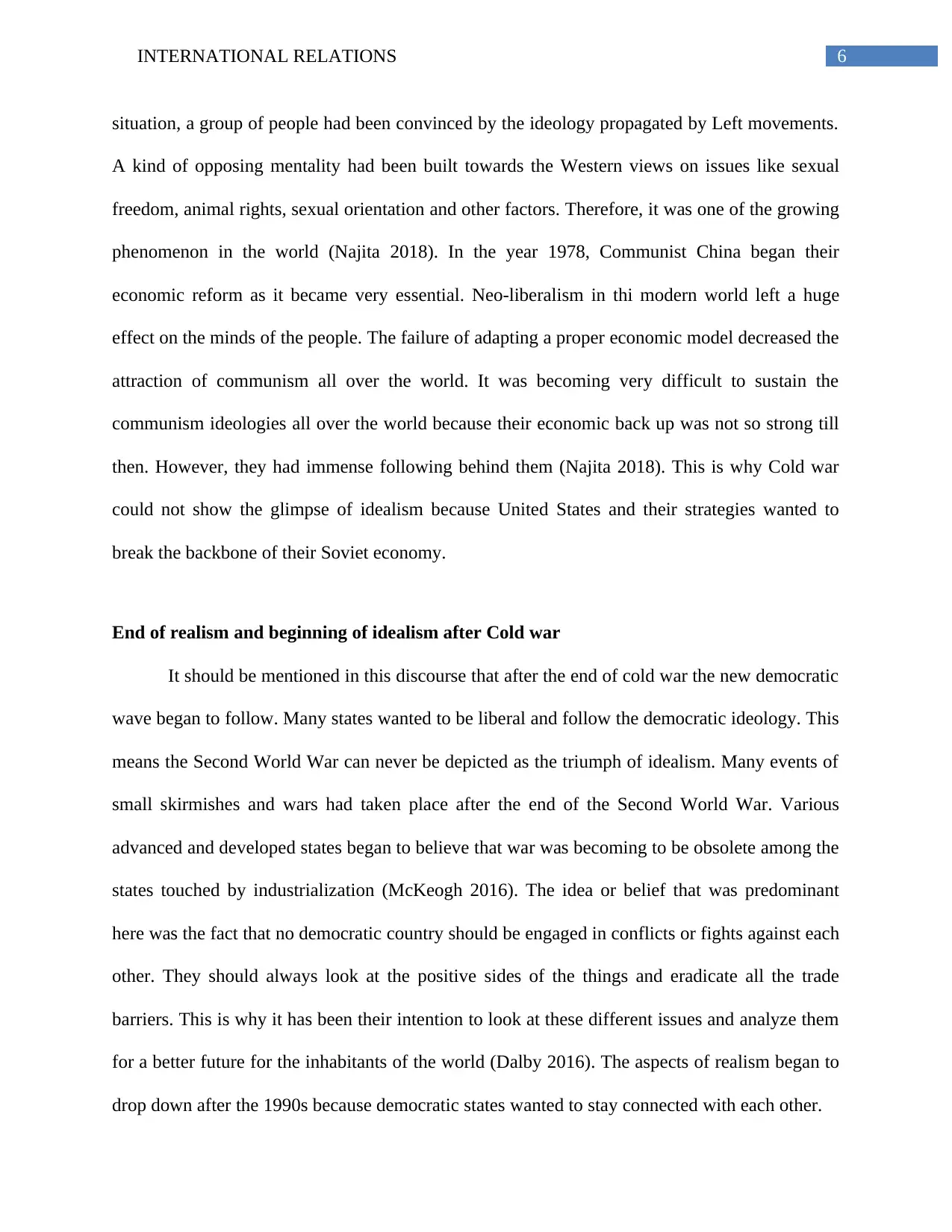
6INTERNATIONAL RELATIONS
situation, a group of people had been convinced by the ideology propagated by Left movements.
A kind of opposing mentality had been built towards the Western views on issues like sexual
freedom, animal rights, sexual orientation and other factors. Therefore, it was one of the growing
phenomenon in the world (Najita 2018). In the year 1978, Communist China began their
economic reform as it became very essential. Neo-liberalism in thi modern world left a huge
effect on the minds of the people. The failure of adapting a proper economic model decreased the
attraction of communism all over the world. It was becoming very difficult to sustain the
communism ideologies all over the world because their economic back up was not so strong till
then. However, they had immense following behind them (Najita 2018). This is why Cold war
could not show the glimpse of idealism because United States and their strategies wanted to
break the backbone of their Soviet economy.
End of realism and beginning of idealism after Cold war
It should be mentioned in this discourse that after the end of cold war the new democratic
wave began to follow. Many states wanted to be liberal and follow the democratic ideology. This
means the Second World War can never be depicted as the triumph of idealism. Many events of
small skirmishes and wars had taken place after the end of the Second World War. Various
advanced and developed states began to believe that war was becoming to be obsolete among the
states touched by industrialization (McKeogh 2016). The idea or belief that was predominant
here was the fact that no democratic country should be engaged in conflicts or fights against each
other. They should always look at the positive sides of the things and eradicate all the trade
barriers. This is why it has been their intention to look at these different issues and analyze them
for a better future for the inhabitants of the world (Dalby 2016). The aspects of realism began to
drop down after the 1990s because democratic states wanted to stay connected with each other.
situation, a group of people had been convinced by the ideology propagated by Left movements.
A kind of opposing mentality had been built towards the Western views on issues like sexual
freedom, animal rights, sexual orientation and other factors. Therefore, it was one of the growing
phenomenon in the world (Najita 2018). In the year 1978, Communist China began their
economic reform as it became very essential. Neo-liberalism in thi modern world left a huge
effect on the minds of the people. The failure of adapting a proper economic model decreased the
attraction of communism all over the world. It was becoming very difficult to sustain the
communism ideologies all over the world because their economic back up was not so strong till
then. However, they had immense following behind them (Najita 2018). This is why Cold war
could not show the glimpse of idealism because United States and their strategies wanted to
break the backbone of their Soviet economy.
End of realism and beginning of idealism after Cold war
It should be mentioned in this discourse that after the end of cold war the new democratic
wave began to follow. Many states wanted to be liberal and follow the democratic ideology. This
means the Second World War can never be depicted as the triumph of idealism. Many events of
small skirmishes and wars had taken place after the end of the Second World War. Various
advanced and developed states began to believe that war was becoming to be obsolete among the
states touched by industrialization (McKeogh 2016). The idea or belief that was predominant
here was the fact that no democratic country should be engaged in conflicts or fights against each
other. They should always look at the positive sides of the things and eradicate all the trade
barriers. This is why it has been their intention to look at these different issues and analyze them
for a better future for the inhabitants of the world (Dalby 2016). The aspects of realism began to
drop down after the 1990s because democratic states wanted to stay connected with each other.
Paraphrase This Document
Need a fresh take? Get an instant paraphrase of this document with our AI Paraphraser
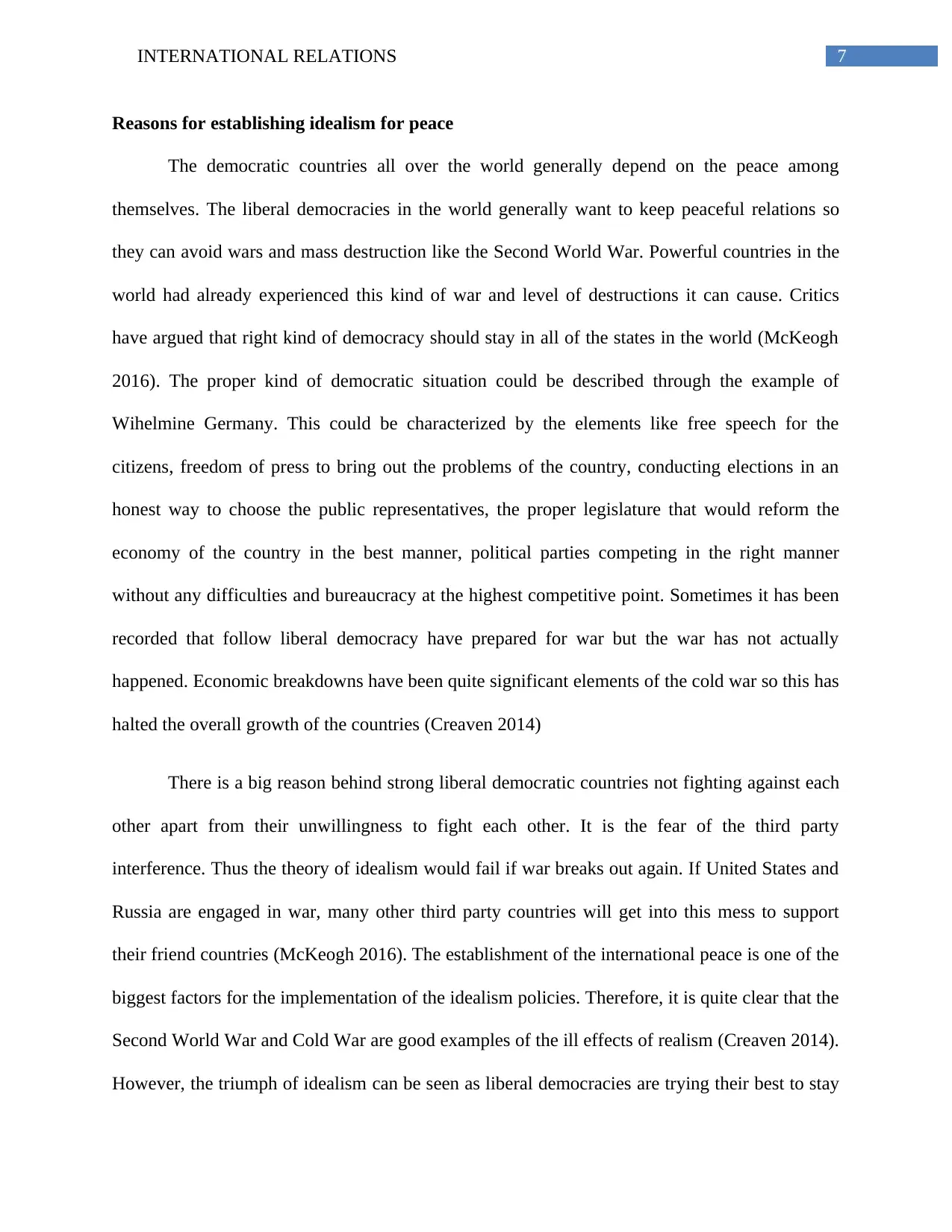
7INTERNATIONAL RELATIONS
Reasons for establishing idealism for peace
The democratic countries all over the world generally depend on the peace among
themselves. The liberal democracies in the world generally want to keep peaceful relations so
they can avoid wars and mass destruction like the Second World War. Powerful countries in the
world had already experienced this kind of war and level of destructions it can cause. Critics
have argued that right kind of democracy should stay in all of the states in the world (McKeogh
2016). The proper kind of democratic situation could be described through the example of
Wihelmine Germany. This could be characterized by the elements like free speech for the
citizens, freedom of press to bring out the problems of the country, conducting elections in an
honest way to choose the public representatives, the proper legislature that would reform the
economy of the country in the best manner, political parties competing in the right manner
without any difficulties and bureaucracy at the highest competitive point. Sometimes it has been
recorded that follow liberal democracy have prepared for war but the war has not actually
happened. Economic breakdowns have been quite significant elements of the cold war so this has
halted the overall growth of the countries (Creaven 2014)
There is a big reason behind strong liberal democratic countries not fighting against each
other apart from their unwillingness to fight each other. It is the fear of the third party
interference. Thus the theory of idealism would fail if war breaks out again. If United States and
Russia are engaged in war, many other third party countries will get into this mess to support
their friend countries (McKeogh 2016). The establishment of the international peace is one of the
biggest factors for the implementation of the idealism policies. Therefore, it is quite clear that the
Second World War and Cold War are good examples of the ill effects of realism (Creaven 2014).
However, the triumph of idealism can be seen as liberal democracies are trying their best to stay
Reasons for establishing idealism for peace
The democratic countries all over the world generally depend on the peace among
themselves. The liberal democracies in the world generally want to keep peaceful relations so
they can avoid wars and mass destruction like the Second World War. Powerful countries in the
world had already experienced this kind of war and level of destructions it can cause. Critics
have argued that right kind of democracy should stay in all of the states in the world (McKeogh
2016). The proper kind of democratic situation could be described through the example of
Wihelmine Germany. This could be characterized by the elements like free speech for the
citizens, freedom of press to bring out the problems of the country, conducting elections in an
honest way to choose the public representatives, the proper legislature that would reform the
economy of the country in the best manner, political parties competing in the right manner
without any difficulties and bureaucracy at the highest competitive point. Sometimes it has been
recorded that follow liberal democracy have prepared for war but the war has not actually
happened. Economic breakdowns have been quite significant elements of the cold war so this has
halted the overall growth of the countries (Creaven 2014)
There is a big reason behind strong liberal democratic countries not fighting against each
other apart from their unwillingness to fight each other. It is the fear of the third party
interference. Thus the theory of idealism would fail if war breaks out again. If United States and
Russia are engaged in war, many other third party countries will get into this mess to support
their friend countries (McKeogh 2016). The establishment of the international peace is one of the
biggest factors for the implementation of the idealism policies. Therefore, it is quite clear that the
Second World War and Cold War are good examples of the ill effects of realism (Creaven 2014).
However, the triumph of idealism can be seen as liberal democracies are trying their best to stay
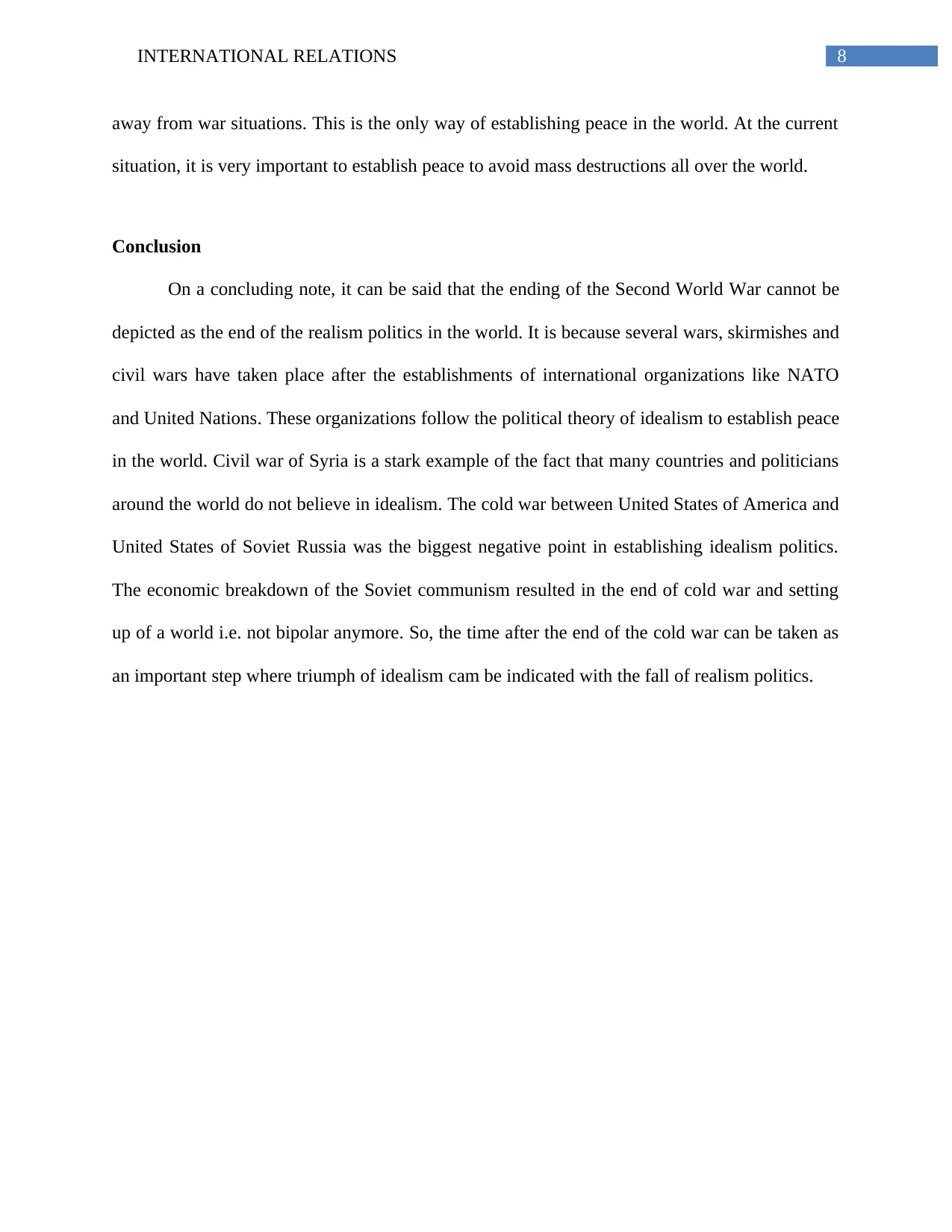
8INTERNATIONAL RELATIONS
away from war situations. This is the only way of establishing peace in the world. At the current
situation, it is very important to establish peace to avoid mass destructions all over the world.
Conclusion
On a concluding note, it can be said that the ending of the Second World War cannot be
depicted as the end of the realism politics in the world. It is because several wars, skirmishes and
civil wars have taken place after the establishments of international organizations like NATO
and United Nations. These organizations follow the political theory of idealism to establish peace
in the world. Civil war of Syria is a stark example of the fact that many countries and politicians
around the world do not believe in idealism. The cold war between United States of America and
United States of Soviet Russia was the biggest negative point in establishing idealism politics.
The economic breakdown of the Soviet communism resulted in the end of cold war and setting
up of a world i.e. not bipolar anymore. So, the time after the end of the cold war can be taken as
an important step where triumph of idealism cam be indicated with the fall of realism politics.
away from war situations. This is the only way of establishing peace in the world. At the current
situation, it is very important to establish peace to avoid mass destructions all over the world.
Conclusion
On a concluding note, it can be said that the ending of the Second World War cannot be
depicted as the end of the realism politics in the world. It is because several wars, skirmishes and
civil wars have taken place after the establishments of international organizations like NATO
and United Nations. These organizations follow the political theory of idealism to establish peace
in the world. Civil war of Syria is a stark example of the fact that many countries and politicians
around the world do not believe in idealism. The cold war between United States of America and
United States of Soviet Russia was the biggest negative point in establishing idealism politics.
The economic breakdown of the Soviet communism resulted in the end of cold war and setting
up of a world i.e. not bipolar anymore. So, the time after the end of the cold war can be taken as
an important step where triumph of idealism cam be indicated with the fall of realism politics.
⊘ This is a preview!⊘
Do you want full access?
Subscribe today to unlock all pages.

Trusted by 1+ million students worldwide
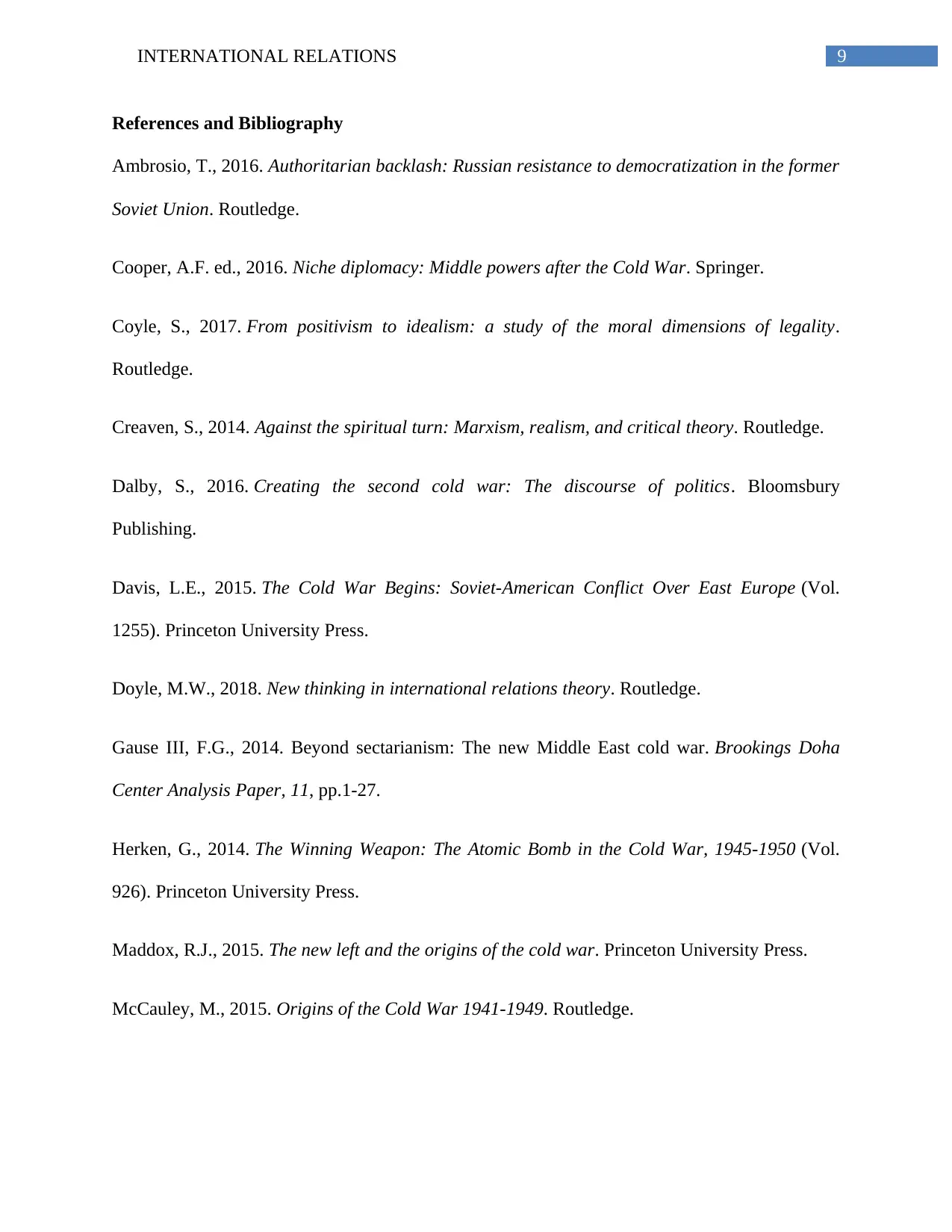
9INTERNATIONAL RELATIONS
References and Bibliography
Ambrosio, T., 2016. Authoritarian backlash: Russian resistance to democratization in the former
Soviet Union. Routledge.
Cooper, A.F. ed., 2016. Niche diplomacy: Middle powers after the Cold War. Springer.
Coyle, S., 2017. From positivism to idealism: a study of the moral dimensions of legality.
Routledge.
Creaven, S., 2014. Against the spiritual turn: Marxism, realism, and critical theory. Routledge.
Dalby, S., 2016. Creating the second cold war: The discourse of politics. Bloomsbury
Publishing.
Davis, L.E., 2015. The Cold War Begins: Soviet-American Conflict Over East Europe (Vol.
1255). Princeton University Press.
Doyle, M.W., 2018. New thinking in international relations theory. Routledge.
Gause III, F.G., 2014. Beyond sectarianism: The new Middle East cold war. Brookings Doha
Center Analysis Paper, 11, pp.1-27.
Herken, G., 2014. The Winning Weapon: The Atomic Bomb in the Cold War, 1945-1950 (Vol.
926). Princeton University Press.
Maddox, R.J., 2015. The new left and the origins of the cold war. Princeton University Press.
McCauley, M., 2015. Origins of the Cold War 1941-1949. Routledge.
References and Bibliography
Ambrosio, T., 2016. Authoritarian backlash: Russian resistance to democratization in the former
Soviet Union. Routledge.
Cooper, A.F. ed., 2016. Niche diplomacy: Middle powers after the Cold War. Springer.
Coyle, S., 2017. From positivism to idealism: a study of the moral dimensions of legality.
Routledge.
Creaven, S., 2014. Against the spiritual turn: Marxism, realism, and critical theory. Routledge.
Dalby, S., 2016. Creating the second cold war: The discourse of politics. Bloomsbury
Publishing.
Davis, L.E., 2015. The Cold War Begins: Soviet-American Conflict Over East Europe (Vol.
1255). Princeton University Press.
Doyle, M.W., 2018. New thinking in international relations theory. Routledge.
Gause III, F.G., 2014. Beyond sectarianism: The new Middle East cold war. Brookings Doha
Center Analysis Paper, 11, pp.1-27.
Herken, G., 2014. The Winning Weapon: The Atomic Bomb in the Cold War, 1945-1950 (Vol.
926). Princeton University Press.
Maddox, R.J., 2015. The new left and the origins of the cold war. Princeton University Press.
McCauley, M., 2015. Origins of the Cold War 1941-1949. Routledge.
Paraphrase This Document
Need a fresh take? Get an instant paraphrase of this document with our AI Paraphraser
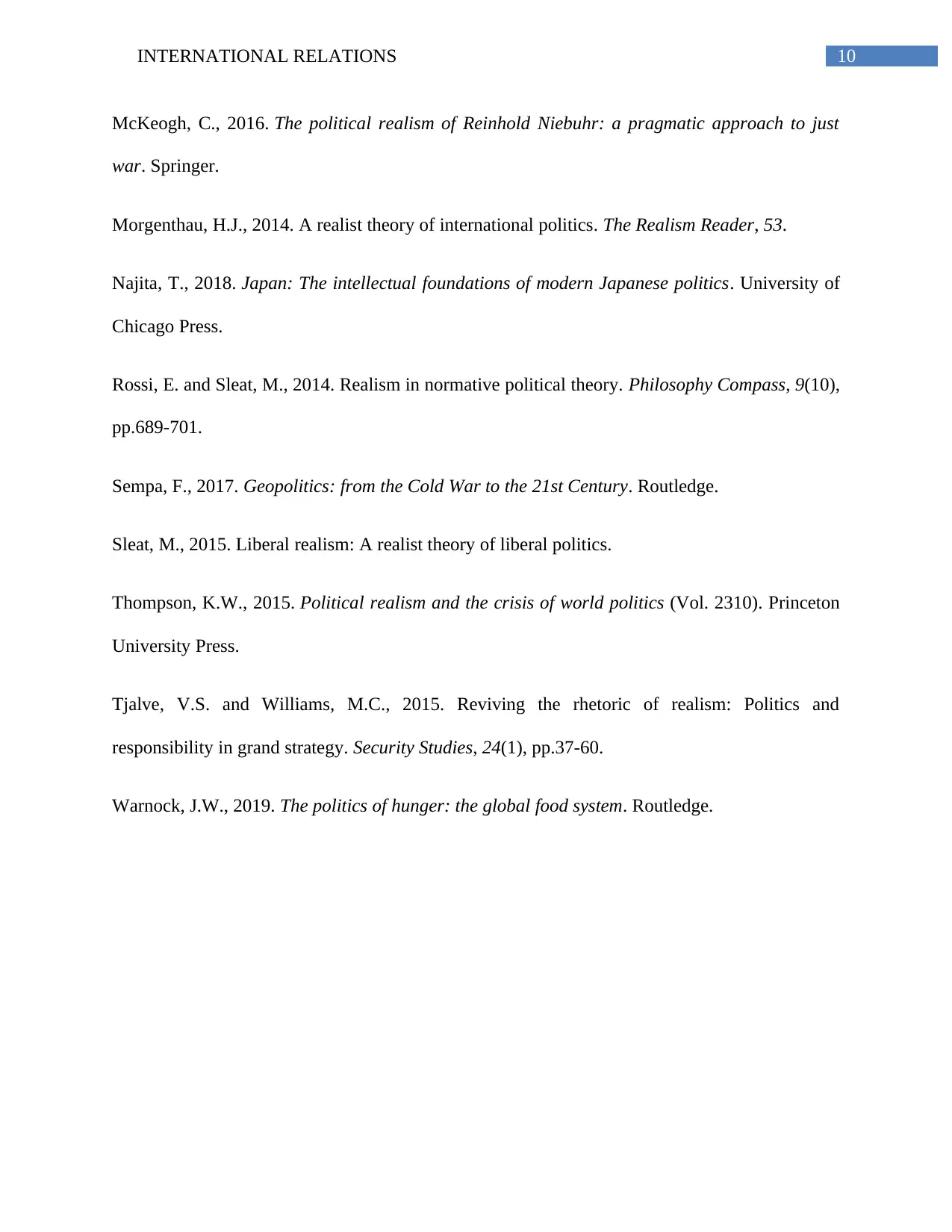
10INTERNATIONAL RELATIONS
McKeogh, C., 2016. The political realism of Reinhold Niebuhr: a pragmatic approach to just
war. Springer.
Morgenthau, H.J., 2014. A realist theory of international politics. The Realism Reader, 53.
Najita, T., 2018. Japan: The intellectual foundations of modern Japanese politics. University of
Chicago Press.
Rossi, E. and Sleat, M., 2014. Realism in normative political theory. Philosophy Compass, 9(10),
pp.689-701.
Sempa, F., 2017. Geopolitics: from the Cold War to the 21st Century. Routledge.
Sleat, M., 2015. Liberal realism: A realist theory of liberal politics.
Thompson, K.W., 2015. Political realism and the crisis of world politics (Vol. 2310). Princeton
University Press.
Tjalve, V.S. and Williams, M.C., 2015. Reviving the rhetoric of realism: Politics and
responsibility in grand strategy. Security Studies, 24(1), pp.37-60.
Warnock, J.W., 2019. The politics of hunger: the global food system. Routledge.
McKeogh, C., 2016. The political realism of Reinhold Niebuhr: a pragmatic approach to just
war. Springer.
Morgenthau, H.J., 2014. A realist theory of international politics. The Realism Reader, 53.
Najita, T., 2018. Japan: The intellectual foundations of modern Japanese politics. University of
Chicago Press.
Rossi, E. and Sleat, M., 2014. Realism in normative political theory. Philosophy Compass, 9(10),
pp.689-701.
Sempa, F., 2017. Geopolitics: from the Cold War to the 21st Century. Routledge.
Sleat, M., 2015. Liberal realism: A realist theory of liberal politics.
Thompson, K.W., 2015. Political realism and the crisis of world politics (Vol. 2310). Princeton
University Press.
Tjalve, V.S. and Williams, M.C., 2015. Reviving the rhetoric of realism: Politics and
responsibility in grand strategy. Security Studies, 24(1), pp.37-60.
Warnock, J.W., 2019. The politics of hunger: the global food system. Routledge.
1 out of 11
Related Documents
Your All-in-One AI-Powered Toolkit for Academic Success.
+13062052269
info@desklib.com
Available 24*7 on WhatsApp / Email
![[object Object]](/_next/static/media/star-bottom.7253800d.svg)
Unlock your academic potential
Copyright © 2020–2026 A2Z Services. All Rights Reserved. Developed and managed by ZUCOL.





